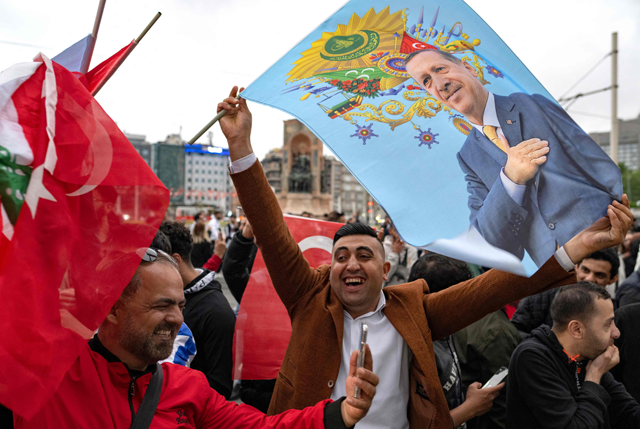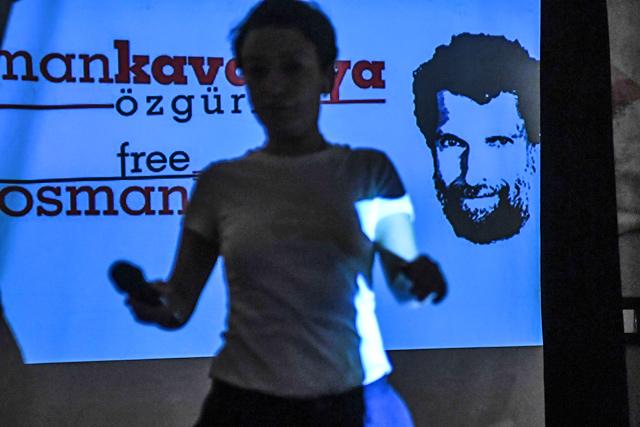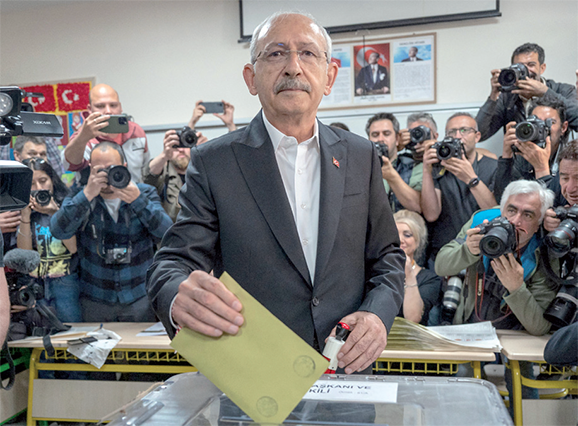You are here
West braces for Turkey’s possible expulsion of 10 envoys
By AFP - Oct 25,2021 - Last updated at Oct 25,2021

A handout photo taken and realesed by the Turkish Presidential Press Service on Monday, shows Turkish President Recep Tayyip Erdogan chairing a presidential Cabinet at the Presidential Palace, in Ankara (AFP photo)
ANKARA — Turkey’s relations with Western allies edged on Monday toward their deepest crisis of President Recep Tayyip Erdogan’s 19-year rule, as world capitals braced for Ankara’s possible expulsion of ambassadors from the US and nine other countries.
The lira broke through historic lows ahead of a Cabinet meeting that could prove fateful to Turkey’s economic and diplomatic standing for the coming months — and some analysts fear years.
The Cabinet session will address Erdogan’s decision next Saturday to declare the Western envoys “persona non grata” for their joint statement in support of jailed philanthropist Osman Kavala.
Expulsion orders are officially issued by foreign ministries and none of the Western capitals had reported receiving any by Monday.
Some analysts said Turkish Foreign Minister Mevlut Cavusoglu and a few other Cabinet members were still trying to talk Erdogan out of following through on his threat and to change his mind.
But the Turkish lira — a gauge of both investor confidence and political stability — lost more than 1 per cent in value on fears of an effective break in Ankara’s relations with its main allies and most important trading partners.
“Typically, the countries whose ambassadors have been kicked out retaliate with tit-for-tat expulsions, potentially in a coordinated manner,” Eurasia Group’s Europe Director Emre Peker said.
“Restoring high-level diplomatic relations after such a spat would prove challenging.”
‘False justification’
The crisis started when the embassies of the United States, Germany, Canada, Denmark, Finland, France, The Netherlands, New Zealand, Norway and Sweden issued a highly unusual statement last Monday calling for Kavala’s release.
The 64-year-old civil society leader and businessman has been in jail without a conviction for four years.
Supporters view Kavala as an innocent symbol of the growing intolerance of political dissent Erdogan developed after surviving a failed military putsch in 2016.
But Erdogan accuses Kavala of financing a wave of 2013 anti-government protests and then playing a role in the coup attempt.
The diplomatic escalation comes as Erdogan faces falling domestic approval numbers and a brewing economic crisis that has seen life turn more painful for ordinary Turks.
Main opposition leader Kemal Kilicdaroglu accused Erdogan of trying to artificially deflect attention from Turkey’s economic woes ahead of a general election due by June 2023.
“These actions are not to protect the national interests, it’s an attempt to create false justifications for the economy that he has destroyed,” Kilicdaroglu tweeted on Saturday.
‘More difficult days’
Erdogan’s rule as prime minister and president has been punctuated by a series of crises and then rapprochements with the West.
But analysts believe his latest actions could open up the deepest and most lasting rift to date.
They could also cast a pall over a G-20 meeting in Rome this weekend at which Erdogan had expected to discuss with US President Joe Biden his hopes of buying a large batch of US fighter planes.
Erdogan this month further threatened to launch a new military campaign in Syria and orchestrated changes at the central bank that infuriated investors and saw the lira accelerate its record slide.
A dollar now buys about 9.75 liras. The exchange rate stood at less than 7.4 liras at the start of the year — and at 3.5 liras in 2017.
“I am really sad for my country,” Istanbul law office worker Gulseren Pilat said as the country awaited Erdogan’s next move.
“I really hope that it will not be as bad as we fear,” said Pilat. “But I am convinced that even more difficult days await us.”
‘Skipping confrontation’
Turkey’s financial problems have been accompanied by an unusual spike in dissent from the country’s business community.
The Turkish Industry and Business Association issued a veiled swipe at Erdogan last week by urging the government to focus on stabilising the lira and bring the annual inflation rate — now at almost 20 per cent — under control.
But some analysts pointed out that some European powers — including fellow NATO member Britain — refrained from joining the Western call for Kavala’s release.
“The conspicuous absence of the UK, Spain, and Italy... is telling, pointing at the emergence of a sub-group within the Western family of nations adept at skipping confrontation with Ankara,” political analyst Soner Cagaptay wrote.
Related Articles
ISTANBUL — Turkish President Recep Tayyip Erdogan on Monday confronted the tough task of uniting his deeply divided country after winning a
ISTANBUL — A Turkish prosecutor on Wednesday sought life in prison for 16 suspects including philanthropist and businessman Osman Kavala cha
ISTANBUL — Turkey's secular opposition leader may have succeeded in forcing President Recep Tayyip Erdogan into his first ever runoff, but h















